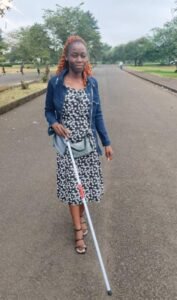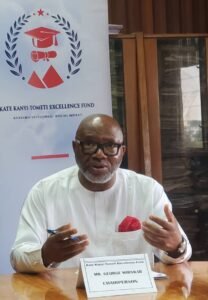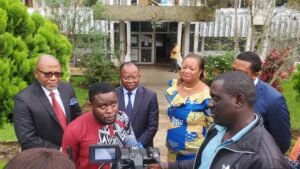By Regis Che, Cameroon
Persons with disabilities in Africa hardly realize their full potentials especially when they require formal education as a bridge to accomplish their dreams. This is often due to poverty. Thousands of children and youth with disabilities hardly have enough to feed on, talk less of accessing university education.
The narrative is gradually changing for disabled students of the University of Buea, Southwest region of Cameroon. This is thanks to Kate Kanyi-Tometi Excellence Fund, an award to recognize and support 1000 students of the institution annually. Soon to be in its second edition, the first phase of the project, designed to run for five years, promotes STEM (Science, Technology, Engineering and Mathematics) education by providing scholarships to 1000 outstanding students of the University of Buea (UB). STEM education continues to face a lot of challenges in Africa where inadequate training facilities, poor and expensive internet connectivity impede learning; a gap which the award seeks to address beginning from Cameroon.

All disabled students, however, benefit yearly on the basis of equity. The Award’s funder, Kate Kanyi-Tometi, a Cameroonian business magnet and philanthropist says the goal is to ensure that “financial resources do not obstruct the dreams of disabled students.” Kanyi-Tometi admits these special needs students are dear to her heart.
During a board meeting held recently at the conference room of UB to evaluate the impact of the first year of the grant and pitch the framework for the second edition, members noted that much is changing in terms of students’ performance. Not only awardees of last edition have had improved results, but other students who are determined to also be recognized and supported have also bettered their performances. Already, the scholarship is positively impacting the academic performance of students with disabilities.
Speaking to DNA in a recent interview, Adele Nguizana, first-year visually impaired Masters student says she recorded her highest GPA ever since enrolling in the University thanks to the support from the grant. “The fund enabled me to purchase Braille writing materials and internet bundles [internet connectivity] which made me earn my highest GPA ever of 3.50,” she reveals to DNA, her face enveloped with joy.

Another beneficiary, Revival Abah, a student with an amputated arm intimates that the fund was not only timely but extremely helpful. Due to his impairment, he says he would hardly make it to class early especially during morning periods due to lack of resources to board a taxi to school. The final year English Law undergraduate student notes the challenge is getting significant improvement, owing to the assistance from the grant. “I was able to buy hand-outs and this really raised my GPA at the end of the semester,” he adds, smiling like a newly wedded groom. Adele and Revival are two out of 171 beneficiaries with disabilities from the last edition which saw 50 million francs CFA ($85000) distributed to 1000 students drawn from all 11 establishments of the institution.

Speaking to DNA at the close of the evaluation board meeting, the project Chair-man, George Wirnkar expressed satisfaction of the impact recorded so far, stressing that the next edition to be provided in December, 2024, would not only recognize and award on academic performance basis. “The novelty is that we will reward students who do outstanding community work in order to strongly encourage community engagement among them,” he says. The Chair-man also insisted that those with a good academic report-card but are morally bankrupt are disqualified for the scholarship.
Another member of the project board who speaks about the impact the fund is having on the education of disabled students is Disability News Africa’s Managing Editor, Princely Kesah. He equally leads the association charged with advocating for and supporting students with disabilities in the institution. “The fund is the real definition of equity because once the ground is level, students with disabilities would compete to win at any level. Already, there is a visually impaired student with 3.80 GPA in the department of Journalism and Mass Communication whose academic excellence is backed by the grant,” reveals the Disability Rights Journalist cum Lecturer of International Relations and Conflict Resolution in UB’s Faculty of Laws and Political Science.

The Kate Kanyi-Tometi Excellence Fund is a relief not only to students with disabilities but their parents as well. They hardly have the financial resources to send their children to school. Prior to the 2024/2025 academic year in Cameroon, Debora Nji, mother of a university student with visual impairment told DNA in an exclusive interview that the cost of educating her blind son alone is worth the cost of educating four of his non-disabled siblings put together. As the second edition of the Kate Kanyi-Tometi Fund soon gets underway, Adele Nguizana has one wish for the funder. “I plead with the funder to include postgraduate disabled students because we need support especially in the area of research”.